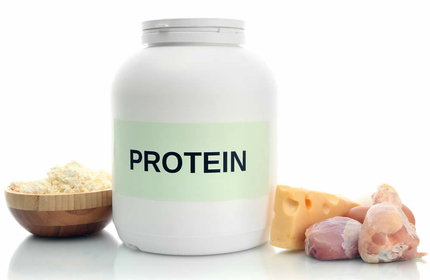
Sufficient protein intake is essential for maintaining lean muscle mass. Athletes' protein requirements are significantly higher, since they need to maintain high physical activity, while power athletes also need protein for gaining muscle mass
Need for protein during strength training
A number of researchers believe that athletes on a low-calorie diet need more protein intake. A protein intake of 1.2-2.2 g/kg body weight is thought to be sufficient for the needs of athletes under normal training conditions.
However, in preparation for competition, bodybuilders reduce the caloric content of their diets and subject themselves to serious strength and cardio training, which makes the athlete's body appear more sculpted[2.Overall, each of the factors described requires an increase in protein consumption, and especially if these factors act in combination[34]. The optimal protein intake of bodybuilders during competition training should be significantly higher than the normally recommended norms.
Tselehova and colleagues[35] report that 5 of 10 weightlifters tested had negative nitrogen balance, with protein intake levels of 2 g/kg body weight per day in all athletes. At the same time, 3 of the 5 athletes with negative protein balance were on a low-calorie diet. A protein intake of 2-2.2 g/kg body weight per day by weightlifters is borderline in terms of loss of lean muscle mass.
Protein Requirements for the Ectomorph
There is evidence that protein requirements are higher in lean athletes compared to other body types.
Wahlberg and colleagues investigated the effect of two different diets among 19 amateur lean bodybuilders (body fat percentage 9.1-16.7%). One group consumed 0.8 g protein per kg body weight per day in conjunction with high carbohydrate intake, the other 1.6 g/kg body weight, with reduced carbohydrate intake. The experiment lasted one week. A negative nitrogen balance was noted only in the low-protein group. The total loss of lean muscle mass was 2.7 kg in the group that consumed 0.8 g/kg protein, and 1.4 kg in the second group.
A recent study by Mettler and colleagues] used the same methodology as the Wahlberg study. However, unlike the Wahlberg experiment, the diets were calorie-balanced by reducing fat in a high-protein diet, while the amount of carbohydrates was the same. At the same time, the first group of subjects consumed 1 g of protein per kg body weight per day, while the other group consumed 2.3 g/kg. After two weeks of the experiment, the loss of lean muscle mass was 1.6 kg in the first group and 0.3 kg in the second group. Thus, the intake of 2.3 g/kg body weight is preferable to the intake of 1 g/kg body weight in terms of lean muscle mass preservation.
A published review by Helms and coworkers recommends a protein intake of 2.3-3.1 g/kg lean body weight for trained athletes with low body fat. This recommendation seems to be more optimal for such athletes during the period of preparation for competition. Furthermore, the authors suggest that the lower the percentage of fat tissue in the athlete's body composition, the greater the amount of protein (in the range of 2.3-3.1 g/kg dry weight) he should consume.
Protein Requirements for Light Training
In a study by Paciacos and colleagues, the recommended daily protein intake was 0.8 g/kg. The researchers found a smaller resulting reduction in lean muscle mass in the group that received 1.6 g protein per kg body weight (double the daily rate) and 2.4 g/kg (triple the rate) compared with the group that received 0.8 g/kg. At the same time, the subjects were asked to adhere to low-intensity, lightweight training "to avoid possible anabolic effects that could affect the results of the study." Thus, the very nature of the experiment potentially did not imply the kind of protein requirement that Mettler and Wahlberg's subjects had.